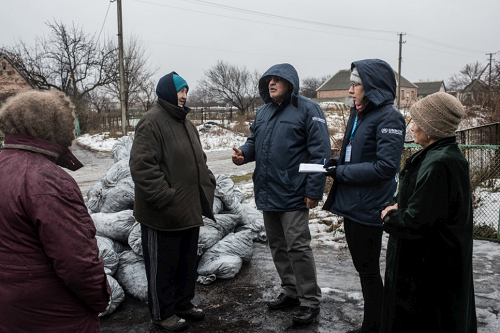Eastern Ukraine: UNHCR speeds up assistance after spike in fighting
UNHCR, the UN Refugee Agency, is increasing its humanitarian assistance to help civilians affected by the recent spike in fighting and the harsh winter conditions in eastern Ukraine.

Displaced residents talk to UNHCR staff in the front line village of Luhanske, in eastern Ukraine.
Fierce clashes over the last two weeks have caused civilian casualties and damaged homes and schools in the government-held town of Avdiivka. After a decline in hostilities over the weekend, 20 new families lost their homes due to shelling on Monday night. In total, close to 150 houses and 30 apartments have been damaged or destroyed by shelling and fighting in Avdiivka since last week.
Last Thursday, UNHCR delivered 40 metric tons of shelter material and relief items for 2,000 people in the town as part of a government-led response. These included blankets, bedding and towel sets, jerrycans, buckets and winter clothing.
Although electricity, water and heating have now been restored in most of Avdiivka, people living in houses close to the contact line are still without services.
Some 300 people, including 135 children, were voluntarily evacuated from Avdiivka last week. However further fighting and damage to critical infrastructure could lead to a new wave of displacement among the more than 800,000 people still residing in the conflict zone.
According to one of our partner organizations, some 46 unaccompanied children arrived in the neighboring town of Slovyansk, some of them without documentation. UNHCR is working with local authorities and partners to provide them with legal assistance and relief items, including blankets, bedding sets and winter jackets.
We welcome the more active role the Ukrainian Government is starting to play in the coordination of humanitarian assistance, both at the provincial and central levels.
The fighting is also severely impacting civilians living in and around Mariupol, in south eastern Ukraine. Over the weekend, the city of Mariupol, which hosts half of million people, was left without electricity for several hours, while some 70 houses were damaged in neighboring villages.
Renewed fighting is also affecting non-government controlled areas. Communities living along the contact line near the city of Donetsk are particularly affected, with more than 20 villages still without electricity, despite temperatures expected to fall below minus 20 C this week.
According to the de-facto authorities of the Donetsk region, some 500 people have been displaced since the surge of fighting late January, the majority of whom are now being sheltered in collective centers.
UNHCR has distributed plastic sheeting and basic relief items to the most vulnerable and to those accommodated in the collective centers in Donetsk. Some 2,000 vulnerable families have also received coal, as part of our winterization programme in non-government controlled areas.
Source: United Nations High Commissioner for Refugees
- 277 reads
Human Rights
Ringing FOWPAL’s Peace Bell for the World:Nobel Peace Prize Laureates’ Visions and Actions

Protecting the World’s Cultural Diversity for a Sustainable Future

The Peace Bell Resonates at the 27th Eurasian Economic Summit

Declaration of World Day of the Power of Hope Endorsed by People in 158 Nations

Puppet Show I International Friendship Day 2020

